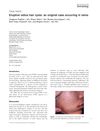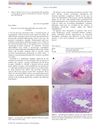 January 2001 in “Clinical and Experimental Dermatology”
January 2001 in “Clinical and Experimental Dermatology” A test for nail fungus was most accurate with PAS stain, low-dose spironolactone helped two-thirds of acne patients, metformin reduced symptoms of HIV-related fat distribution changes with some side effects, and skin examination with dermoscopy was better at detecting abnormal moles, while temporary tattoos can cause skin reactions.
 September 2023 in “Clinical, cosmetic and investigational dermatology”
September 2023 in “Clinical, cosmetic and investigational dermatology” A new surgical method using special sutures significantly reduced wound size and prevented disease return in patients with a scarring scalp condition.
 April 2007 in “Dermatologic Clinics”
April 2007 in “Dermatologic Clinics” Understanding drug effects and careful monitoring are crucial for safe and effective dermatology treatments.
 October 2018 in “Springer eBooks”
October 2018 in “Springer eBooks” The document concludes that various topical medications are effective for skin conditions but often cause skin irritation as a side effect.
 5 citations,
January 2013 in “PubMed”
5 citations,
January 2013 in “PubMed” Green tea may help with various skin conditions and protect the skin when taken orally or applied topically, but its effectiveness is not always proven.
 January 2011 in “Journal of pediatric endocrinology & metabolism/Journal of pediatric endocrinology and metabolism”
January 2011 in “Journal of pediatric endocrinology & metabolism/Journal of pediatric endocrinology and metabolism” Hyperthyroidism can hide signs of high androgen levels in females.
35 citations,
October 2003 in “Dermatologic clinics” Laser therapy on darker skin has higher risks and needs expert handling.
 8 citations,
January 2011 in “Collection of Czechoslovak Chemical Communications”
8 citations,
January 2011 in “Collection of Czechoslovak Chemical Communications” Researchers developed a sensitive method to measure minoxidil in various products with high accuracy.
December 2017 in “Annales de dermatologie et de vénéréologie” In 2017, pediatric dermatology advanced with new treatments and insights into various skin conditions in children.
 November 1995 in “Journal of Pediatric Health Care”
November 1995 in “Journal of Pediatric Health Care” Most hair loss in kids and teens is due to common conditions, and hair usually grows back within 6 months.
 29 citations,
March 2017 in “International Journal of Women's Dermatology”
29 citations,
March 2017 in “International Journal of Women's Dermatology” Hormone therapies like birth control pills and spironolactone are safe and effective for treating women's adult acne.
 4 citations,
July 2014 in “International Journal of Dermatology”
4 citations,
July 2014 in “International Journal of Dermatology” Twins had rare skin cysts likely due to genetics.
 10 citations,
June 2018 in “Aaps Pharmscitech”
10 citations,
June 2018 in “Aaps Pharmscitech” The flutamide-loaded hydrogel is a promising, skin-friendly treatment for acne and hair loss, potentially requiring less frequent application.
January 2016 in “Indian dermatology online journal” Frontal fibrosing alopecia causes hair loss at the front hairline, and no effective treatment exists.
 5 citations,
August 2014 in “Australasian journal of dermatology”
5 citations,
August 2014 in “Australasian journal of dermatology” Sorafenib can cause delayed skin problems, so patients need careful monitoring.
6 citations,
March 1990 in “The American journal of cosmetic surgery”  June 2024 in “Journal of Cosmetic Dermatology”
June 2024 in “Journal of Cosmetic Dermatology” Higher homocysteine levels may inhibit hair growth and are linked to androgenetic alopecia.
 57 citations,
August 1995 in “British Journal of Dermatology”
57 citations,
August 1995 in “British Journal of Dermatology” Acne severity is linked to higher levels of certain androgenic hormones, even when those levels are within the normal range.
 September 2024 in “Cosmoderma”
September 2024 in “Cosmoderma” Biotin doesn't help hair growth in healthy people and can cause health risks if overused.
 January 2003 in “Postgraduate medicine”
January 2003 in “Postgraduate medicine” The article concludes that hair loss has many causes and treatments, with medication options like finasteride and minoxidil for men, and minoxidil, hormones, or iron for women, while warning against unproven remedies.
 1 citations,
December 2017 in “Skin appendage disorders”
1 citations,
December 2017 in “Skin appendage disorders” Biotin may help women with hair loss who have low biotin levels, but more research is needed.
 7 citations,
January 2015 in “Current problems in dermatology”
7 citations,
January 2015 in “Current problems in dermatology” Hair loss can be caused by stress, infections, drugs, and various diseases, with treatment depending on accurate diagnosis.
 26 citations,
January 2019 in “Journal of The American Academy of Dermatology”
26 citations,
January 2019 in “Journal of The American Academy of Dermatology” Dermatologists are important in helping transgender people with skin issues and physical changes during their transition.
 35 citations,
May 2012 in “Expert Opinion on Pharmacotherapy”
35 citations,
May 2012 in “Expert Opinion on Pharmacotherapy” The document concludes that there are various treatments for different types of alopecia, but more research is needed for evidence-based treatments.
 January 2023 in “Dermatologic Therapy”
January 2023 in “Dermatologic Therapy” A new hand-held light therapy device was found to be safe and effective for treating mild-to-moderate acne.
 19 citations,
July 2017 in “Pediatric Dermatology”
19 citations,
July 2017 in “Pediatric Dermatology” Finasteride improves hidradenitis suppurativa in children with no adverse effects.
 11 citations,
February 2019 in “Journal of Cosmetic Dermatology”
11 citations,
February 2019 in “Journal of Cosmetic Dermatology” Low zinc and biotin levels linked to male hair loss; supplements may help.
7 citations,
June 2000 in “Journal of the American Academy of Dermatology” Foam corticosteroid covers as well as traditional forms.
14 citations,
January 2014 in “Annals of Dermatology” Some cases of folliculotropic mycosis fungoides may progress slowly and not need aggressive treatment.
January 2005 in “Experimental Dermatology” Genetic factors play a major role in acne.






















